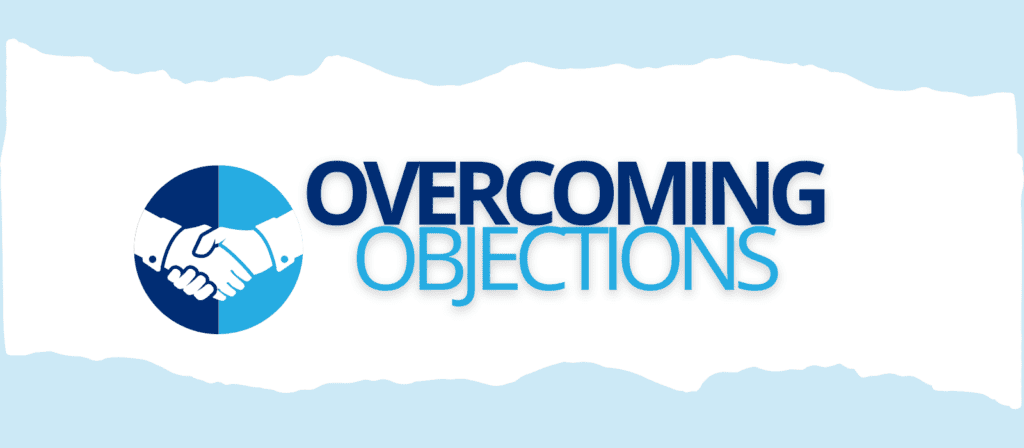Overcoming Objections
The Complete Guide To Overcome Objections in Medicare Sales

Overcoming Objections in Medicare Sales
Objections are a challenging part of any sales role. With more sales being made over the phone, objections can stop you right in your tracks. Here are 3 tips to keep in mind and answers to 11 common objections in Medicare health sales.

3 Tips for Overcoming Objections
Whether your goal is to set up a follow-up appointment, get into a presentation on the same phone call, or close a sale in person, keep these tips in mind.
1. Listen Actively.
By listening carefully and seeking to understand your prospects, you’ll learn what’s important to them. Once you know what’s important to them, you can position your products in a way that solves their problems and answers potential objections before they even become an issue. Remember: the best way to overcome objections is to prevent them in the first place.
2. Ask Questions.
Start asking simple questions from the very beginning. Get to know your prospect personally. We like to tell agents: “Know how to talk about something besides insurance.” Building rapport early helps to prevent objections later on. Once you turn the conversation toward insurance, always start by asking, “Can I ask you a few questions?” Getting someone to say “yes” early on will make it easier when you ask for the sale.
3. Always Acknowledge and Address the Objection.
Phrases like “I completely understand,” “I know how you feel,” or “That makes perfect sense” will disarm the prospect and ease some of the tension. Once you acknowledge the objection, always address it. If you leave it unanswered, the sale will be much more difficult, and the chances of the prospect canceling their new coverage soon after are higher.
Common Objections Answered
1. "I'm Not Interested"

“I completely understand that. But if you have just a few minutes, I think we can save you some significant money on your drug costs and get you more coverage for your dental costs.”
After you acknowledge the objection, restate the purpose of your call or meeting and jump straight to the point. Keep in mind the biggest benefits you can offer to a client: lower drug costs, more options for doctors/network, dental coverage, hearing aids, and glasses.
2. “Can you mail me the information?”

“Absolutely! Since I represent all of the major carriers in the area, can I ask you a few questions to make sure I send you the right information?”
If they agree, go through a needs assessment as needed. If they decline, ask if you can mail them your business card with a letter or brochure. No matter what, send the information and follow up.
3. “I’ve already taken care of my Medicare.”

“That’s fantastic. Did someone already explain to you all the differences between a Medicare Supplement and a Medicare Advantage plan?”
If they pause or hesitate, that gives you the option to review with them and make sure they have the plan they need.
4. “I’m not on Medicare yet.”

“No problem. I want to make sure you know about the penalties for enrolling in Medicare too late. Are you still working? When are you planning to retire?”
If the prospect has a retirement date set, ask if you can call them on a certain date to get them enrolled and make it a seamless transition from employer coverage.
5. “Why are you calling me?”

“I work with people on Medicare in your area. I got your information from the card you returned in the mail/when you submitted your request on Facebook/when you requested a quote online. Could I ask you a few questions?”
In general, tell the prospect exactly where you got their information, and get right into the discovery part of your process.
6. “I already have an agent.”

“I’m really glad to hear that. When was the last time you spoke to them?”
If it has been in the last few months, you can ask them if their agent talked about specific ancillary products like Hospital Indemnity or Cancer insurance.
If it has been around a year or more, you can say:
“That’s really disappointing. A lot can change in the amount of time. Let’s make sure you’re getting all of the benefits you deserve. Can I ask you a few questions?”
7. “I don’t want to make any changes right now.”
“I completely understand that. I don’t think a big change would be good for you right now, but I think we can get you a nice little upgrade/update. Here’s how this would work better for you.”
If they are adamant about not making any changes, you might ask:
“Can I call you back [on X date and time]? There will be some new information I can share with you then.”
Or you could ask:
“Can I mail you my information so you know how to get in touch with me?”
8. “I can’t afford that.”

“Of course, you know your budget much better than I do. Are you paying for any other coverages?”
Acknowledge the objection and be very careful never to push someone financially. It will never work out.
- One agent recently discovered that a prospect was paying $70/month for a $1,000/day Hospital Indemnity plan by using this method. The agent was able to quote a more reasonable daily benefit that saved the beneficiary $30/month.
9. “I need to talk to my son/daughter/POA first.”

“Absolutely. Have them give me a call. I’d love to talk to them too.”
Do not try to pressure a prospect like this to make a decision, even if they don’t have a POA.
10. “I need to talk to my doctor/pharmacist.”

Offer to call the doctor or pharmacist with the prospect right then to verify they accept the coverage you are presenting. If they insist they talk to the doctor or pharmacist by themselves, you might say:
“Sure thing! Talk to them, and I’ll call you back on Monday.”
Kindly remind the client that their doctor or pharmacist can’t legally offer them insurance advice, just as you can’t legally offer them medical advice.
11. “I don’t want to give you that information over the phone.”
“I totally understand why you may not want to share your information over the phone, but I need all of this information to make sure I can help get you these drug savings/dental benefits/ lower monthly costs we’ve talked about.”
You may start to hear this more and more if you are making presentations over the phone. While you don’t want to pry, you should reiterate why you need the prospect’s information. If they refuse, offer to meet them in person, even just briefly.
Don’t let objections derail your sales process. Use these tips, figure out what works for
you, and start closing more sales today!
Need More Help Handling Medicare Sales Objections?
The NCC team is happy to answer any questions you may have about how to answer objections or any other part of Medicare sales.
Call an NCC Marketing Specialist at 800-695-0280 today.

5 Things to remember About Medicare Objections
Just because a customer presents an objection, doesn’t mean it’s the end of the line. Here are some things to keep in mind heading into an appointment.
A “No” is not always a no.
Sometimes people will object to a sale because they do not have enough information. Think of a “no” as a “not yet”. One question to ask would be “Based off what we discussed today, what is holding you back from moving forward?”
Objections are challenging, but can be overcome.
There are some that take longer than others depending upon how staunch somebody’s stance is on their objection. Think about what they are objecting to. Are they objecting to you as the the agent? Are they objecting to the product? Do they have enough information to make an informed decision?
- Take your time, ask more questions, get to the bottom of what they are objecting to.
Remain respectful, warm, and friendly throughout the conversation.
Objections can sound harsh and cold. They are the beneficiaries defense mechanism. Utilize humor where appropriate. Humor usually breaks the ice and can diffuse a situation that is tense.
Listen to learn, not respond.
In sales, it’s crucial to listen to learn, not just to respond. Ask thoughtful, open-ended questions, and you can uncover the true issues and address them genuinely, rather than giving a rehearsed response. This approach helps guide clients to their own conclusions, making them feel like they’ve reached the decision independently. Remain patient and attentive, ready to revisit the conversation when the timing is better.
Don’t take it personally.
When facing objections in Medicare sales or any sale, it’s important to remember that a client’s hesitation is not a reflection of you personally. Some clients may not need the product, may not be able to afford it, or may have legitimate concerns preventing them from making a purchase at the moment. It’s essential to recognize that a “no” often means “not right now.” By understanding this, you can stay focused on the client’s needs and not become discouraged. Keep a record of your interactions and follow up at a later time. Often, this persistence demonstrates professionalism and commitment, which can ultimately lead to a successful sale.

